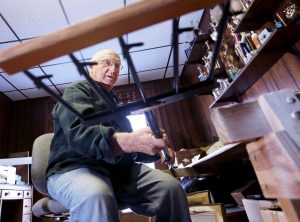Bill Casper and Kathleen Schmitt Kline – “Sturgeon for Tomorrow”
October 31st, 7pm, 1111 Genetics/Biotechnology Center, 425 Henry Mall

According the the Capital Times, “Casper was just 8 years old in 1939 when he tagged along with an uncle who after only a few hours speared a 104-pound sturgeon. It was Casper’s first trip to a spearing shack and helped transform the farm boy into a sturgeon fanatic and, later in life, lead him to create Sturgeon for Tomorrow. Founded in 1977, the advocacy group, as of this year, will have donated $1 million to the state Department of Natural Resources for sturgeon research, management and education.”
I was honestly not too interested in the topic of this presentation prior to attending last night’s talk by Bill Casper and Kathleen Schmitt Klein. While my dad and other members of my family LOVE to go fishing on Lake Winnebago, I have never been super interested in it. However, once Bill began to talk about his progression as first a sturgeon spearer, then an advocate and later as the founder of “Sturgeon for Tomorrow”, I sensed the same amount of passion for the work he does as I heard last week in Emily’s talk.
First, Bill talks about his concern as sturgeon numbers dropped in Lake Winnebago without any knowledge of how to raise them or breed them. His approach to this issue was enlightening – he took the issue into his own hands and held a meeting at the town hall with both fishermen and the DNR. He received lots of support from fellow fishermen, but the DNR didn’t believe Bill knew what he was talking about. Kathleen later shared that this hesitation from the DNR was a result of their belief that the policies regarding sturgeon were rooted in science, and that the DNR felt like they had to protect what they had built up. They believed that the sturgeon in Winnebago were stable and that there was a large enough population for spearers – but the fishermen knew this was not true.
Bill and his pursuit of knowledge surrounding sturgeon reproduction and feeding definitely displays the Wisconsin Idea, although it may not have been clearly stated throughout his talk. His pursuit of the truth through holding town hall meetings, advertising his work in newspapers, and later reaching out to experts on the subject [Bill Ballard at Dartmouth College, Fred Binkowski at UW-Milwaukee] closely aligns with my evolving definition of the Wisconsin Idea. I loved hearing about the ways in which he connected with different individuals to pursue this goal – it was a lot of personal connections that knew other people who may be of use to him. This reminds me of my dad, as he grew up in Two Rivers his whole life and has built up a bunch of personal connections who can lead him to the right people.
“Sturgeon for Tomorrow” quickly grew as an organization – soon chapters were in Fon du Lac, Appleton, and Oshkosh, and later in the states of Michigan and New York. As a whole, this organization has raised over $1 million for sturgeon research and breeding. Bill’s response to this amazing feat was very moving – I could tell he was truly in awe about the success that he and others have had in the journey to conserve this piece of the culture in Wisconsin.
Overall, Bill’s motivation to continue to learn more about sturgeon even after being laughed off by members of the DNR, and his work to spread awareness about the issue and his organization is clear evidence of the Wisconsin Idea. Unlike with Emily’s program last week, I am confident that “Sturgeon for Tomorrow” will continue to be successful after Bill leaves because sturgeon spearing is such a big part of the culture surrounding Lake Winnebago and other areas in the United States.